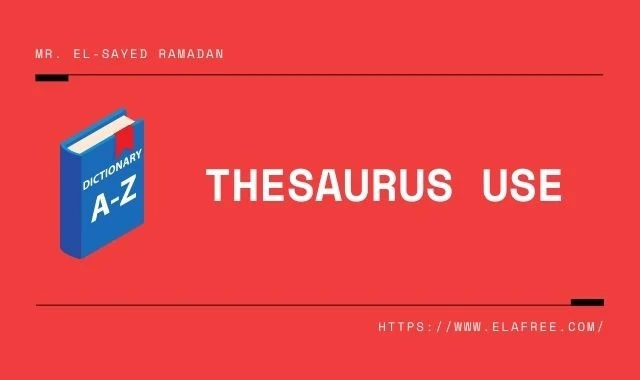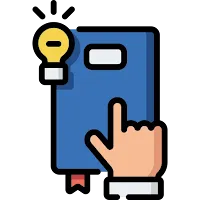Thesaurus Use
Learning Objectives
Thesaurus Terms
A thesaurus is a specialized dictionary that lists synonyms and antonyms.
Tip
To skim through a dictionary or thesaurus quickly, use the guide words located at the top of each page. These list the first and last entry on a page.
Thesaurus Use
Literature Connection
In the quotation below, Asimov uses words that have synonyms, words with similar but not usually identical meanings, to describe both the Old Woman and her typing.
“Back and forth she went, her gnarled fingers tripping over the keys.”
—Isaac Asimov, from “Robot Dreams”
Asimov might have described the gnarled fingers as lumpy or twisted, but neither term would have conveyed a sense of age. Instead of tripping, he might have used stumbling or skipping to convey the action.
When searching for a word, you can consult a thesaurus, a source of synonyms and antonyms. Thesauri (or thesauruses) are available in CDROM, Internet, software, and print formats, organized in two ways.
Traditional Style
This style organizes words by general concept. To find a synonym for the adjective fast, for example, look in the alphabetical index for entries such as speedy and hasty, with page references. On those pages, you would find related synonyms—velocity and haste. Probably the best-known traditional thesaurus is Roget’s Thesaurus.
Dictionary Style
This type of thesaurus presents words in alphabetical order. Each word is followed by several synonyms, which are listed by part of speech and direct the reader to related entries. In this type of thesaurus, you must look up a specific word to find its synonyms. J. I. Rodale’s The Synonym Finder is an example of a dictionary-style thesaurus.
Here is a sample entry for the word gnarled.
FAQs
How can a thesaurus improve writing quality?
Using a thesaurus can improve writing quality by:
- Providing more precise, vivid word choices to better convey meaning
- Avoiding repetition and enhancing variety in language
- Allowing the writer to match tone and style with ideal synonyms
What are some common pitfalls when using a thesaurus?
- Choosing an imprecise synonym that doesn't capture the intended meaning
- Using uncommon or overly complex words that disrupt the flow
- Overusing the thesaurus to the point of sounding unnatural
How to effectively use a thesaurus?
- Understand the various shades of meaning for potential synonyms
- Consider part of speech and context around the original word
- Look for synonyms consistent with the desired tone and register
- Don't automatically choose the first listed synonym
When to consult a thesaurus?
- When revising to reduce repetitive language
- When looking to set a specific tone (formal, casual, academic, etc.)
- When trying to describe something in a more vivid, precise way
- When a particular word seems imprecise or insufficient
What are some alternative vocabulary-building resources?
- Reading challenging material and looking up unfamiliar words
- Using vocabulary-building apps, websites, and games
- Keeping a running list of new words encountered
- Studying word roots, prefixes, and suffixes to decipher meanings



